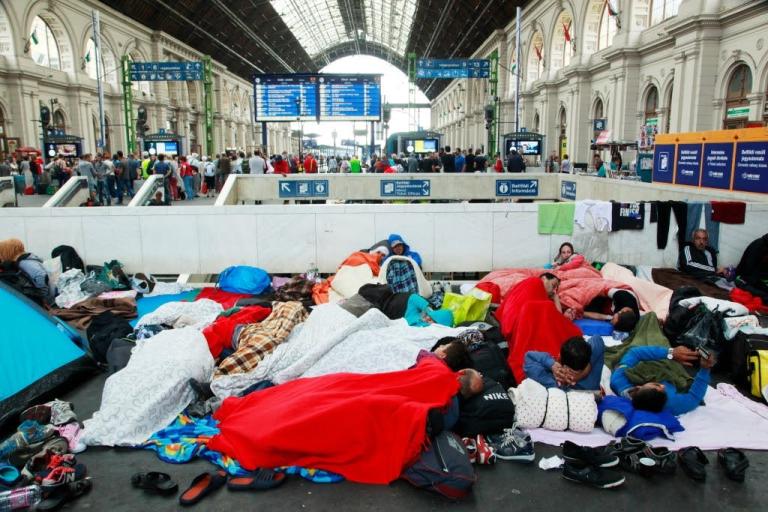
Puerto Rico negotiates a status which is even more autonomous than its current “commonwealth-ness” but not quite that of an independent country. (Let’s say the territory wanted to get itself out of the Jones Act restrictions that increase the cost of goods shipped onto the island.) Then, the country’s government becomes less respecting of civil rights and, because of the semi-autonomous status we’ve granted it, the federal government considers itself unable to intervene.
Then let’s add in a dollup of sci-fi, for instance, the episode from The Orville in which they find themselves on a planet where an extreme form of astrology lands every child born during a month corresponding to a certain astrological sign into a concentration camp.
Should we in the United States welcome the unluckily-born ones from Puerto Rico? Duh. Would it matter whether they were “refugees” or merely “internally displaced”? No, of course not.
Does that have any bearing on whether the United States should open its borders to immigrants from overseas who have crossed through country after country on their way here, who are seeking economic prosperity rather than preservation of life and limb, and in cases where the peril that the would-be immigrants face is not so clear-cut, or could be avoided by leaving for a different region in their own country? What’s more, does a receiving country have an obligation to permanently resettle those who are deemed to be “true refugees” or merely to provide for their material needs until such time as they can return to their home country?
This is a matter of prudential judgment, and even the Pope admits that the call to “welcome the stranger” may be appropriately be balanced with the need to watch for the well-being of the people of the receiving country.
And none of this is altered by the answer to the question of “were the Holy Family refugees?”
Joseph was warned by an angel to leave Bethlehem for Egypt, leaving one part of the Roman Empire for another, just as he had previously moved from Bethlehem to Nazareth and back again. Was Egypt sufficiently separately-governed as to count as a “separate country” and to give the family the label “refugee”? Did they arrive in Egypt bedraggled and in need of charitable support? Was Joseph unable to speak the local language and need translation services? Or did his carpentry expertise and the cultural and linguistic ties mean that he was able to easily integrate himself into the local community?
Likewise, was the Holy Family poor? We have precious little evidence; pretty much all we know was that they offered two pigeons rather than a lamb for Mary’s purification at the temple. But I’m not seeing anything online that explains what the income cut-off is below which a family was considered poor enough not to offer a lamb — especially under such circumstances as having travelled recently and perhaps being short of cash. Did only the poorest of the poor offer the pigeons? Did only the wealthy offer lambs? If there’s a consensus, it’s not easily findable?
Other than that, it’s now become routine to find at this time of year explanations that the narrative of the Holy Family being turned away from house after house (or hotel after hotel) is charming but not in line with what 1st century Judea would have looked like, with “the inn” really being “guest room” and “manger” meaning that they would have slept in the “still a part of the house” barn (which is, incidentally, what you’d see if you visited a German open-air museum). And one might make a case for “Jesus was born into poverty” in the sense that pretty much everyone except landowners and tax collectors in this backwater province of the Roman Empire were poor, but that doesn’t really matter.
So again: “Jesus was a poor refugee.”
Should we help the poor? Should we aid refugees?
On the one hand, duh. Of course, we should.
But at the same time, many of Jesus’s followers expected a literal liberation from the Roman oppressors and were disillusioned when it became clear that he was not going to do that, that he was not going to use his divine power to shatter Roman rule in one stroke, or to lead an army into battle.
And it seems to me that altogether too many people are making the same mistake in 2019, by claiming that Jesus’s message was one of social justice and banding together to fight against oppression, perhaps not violently attempting to overthrow an unjust regime, but focused on the battle against oppression nonetheless, rather than a call to personal repentance. It’s not a prosperity gospel of “God wants you to be rich,” per se, but it still doesn’t sit right with me.
So that’s my “2nd day of Christmas” rant.
Oh, and Merry Christmas!












